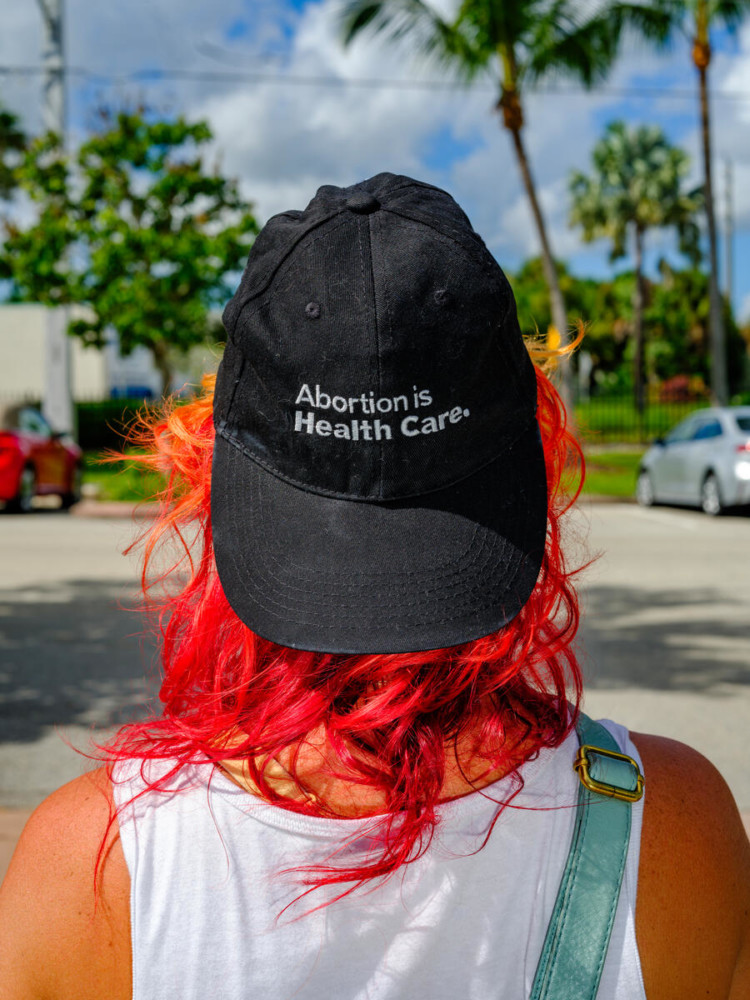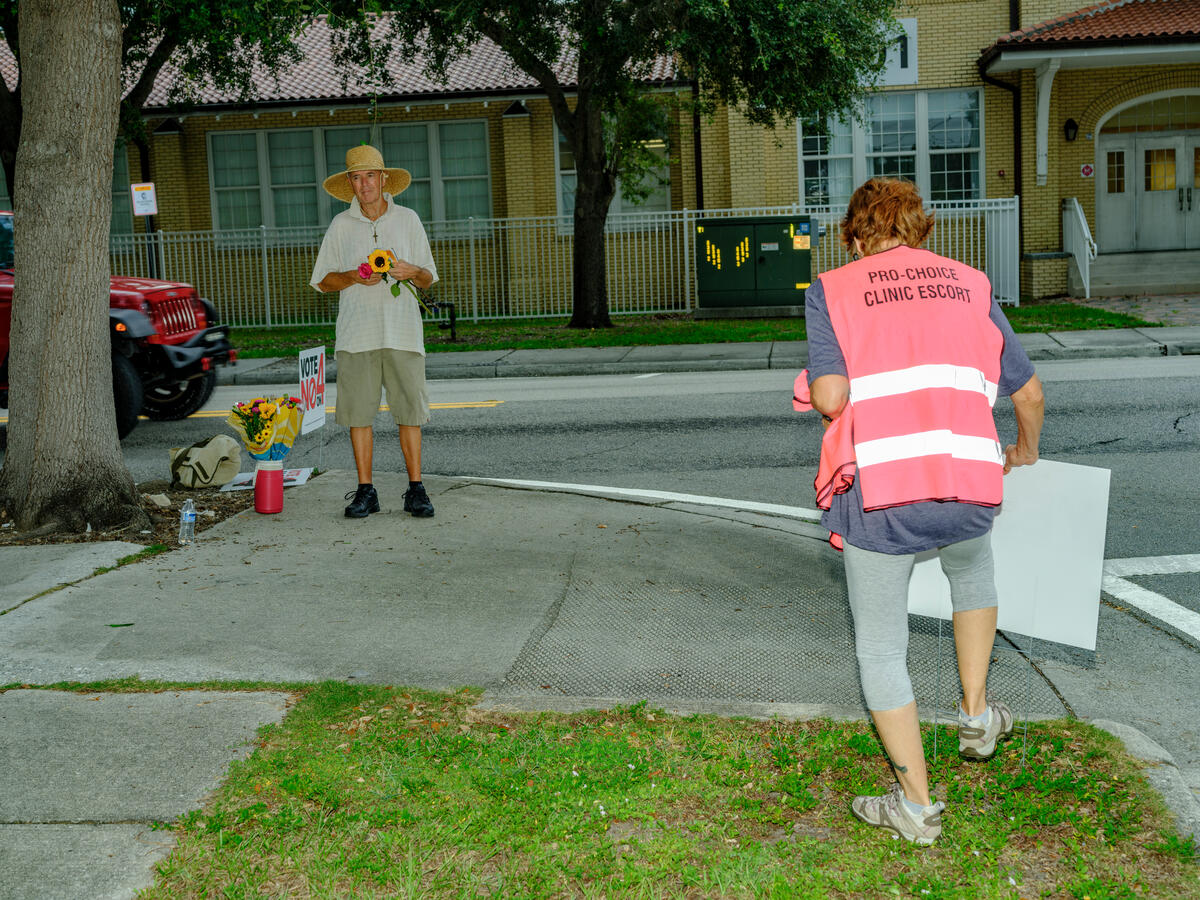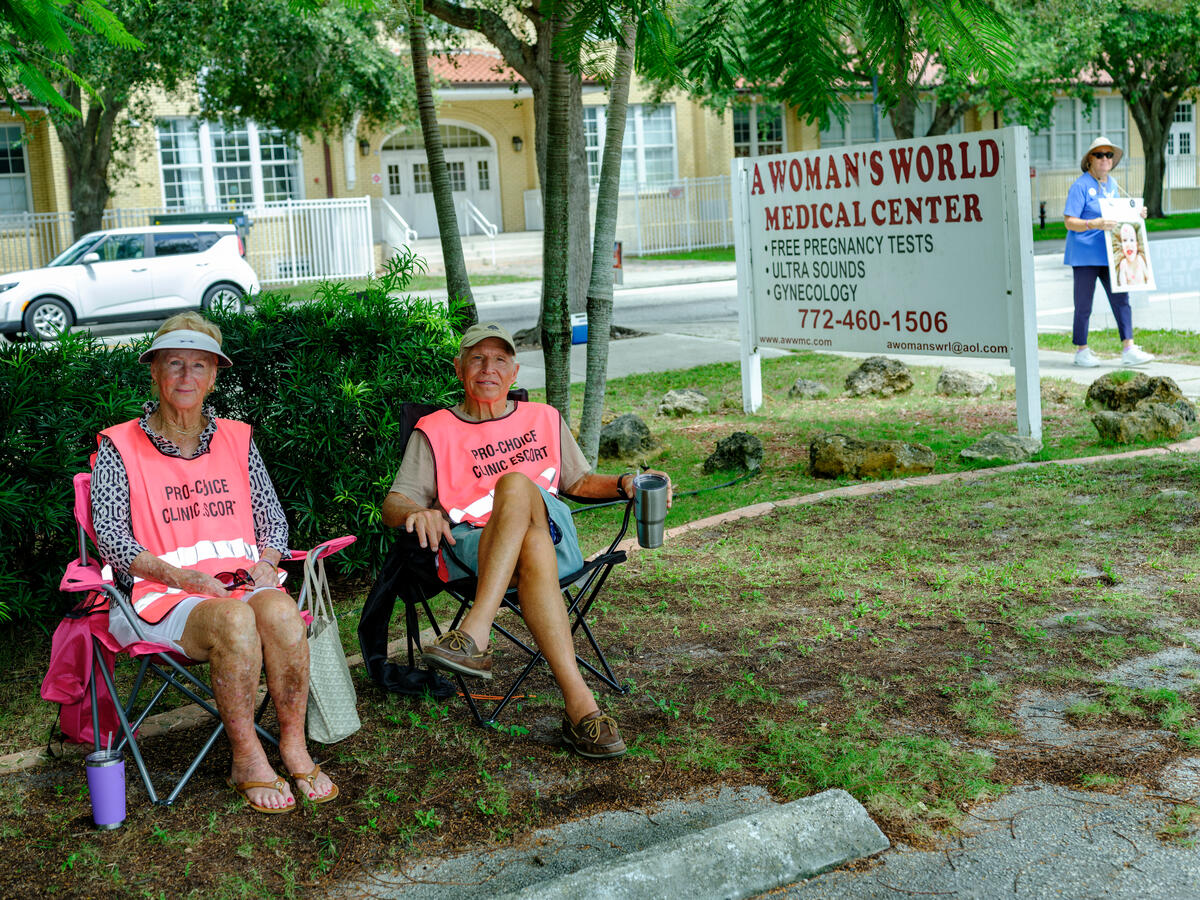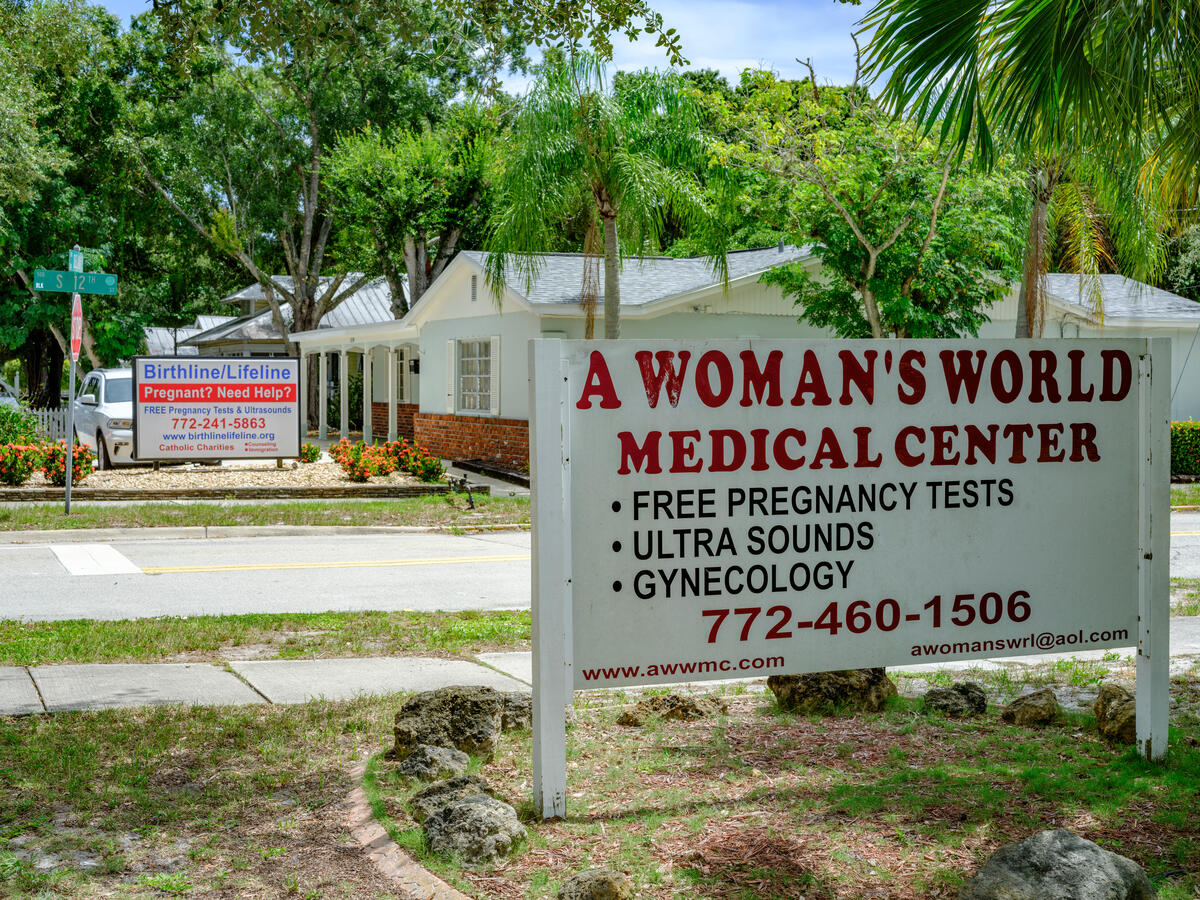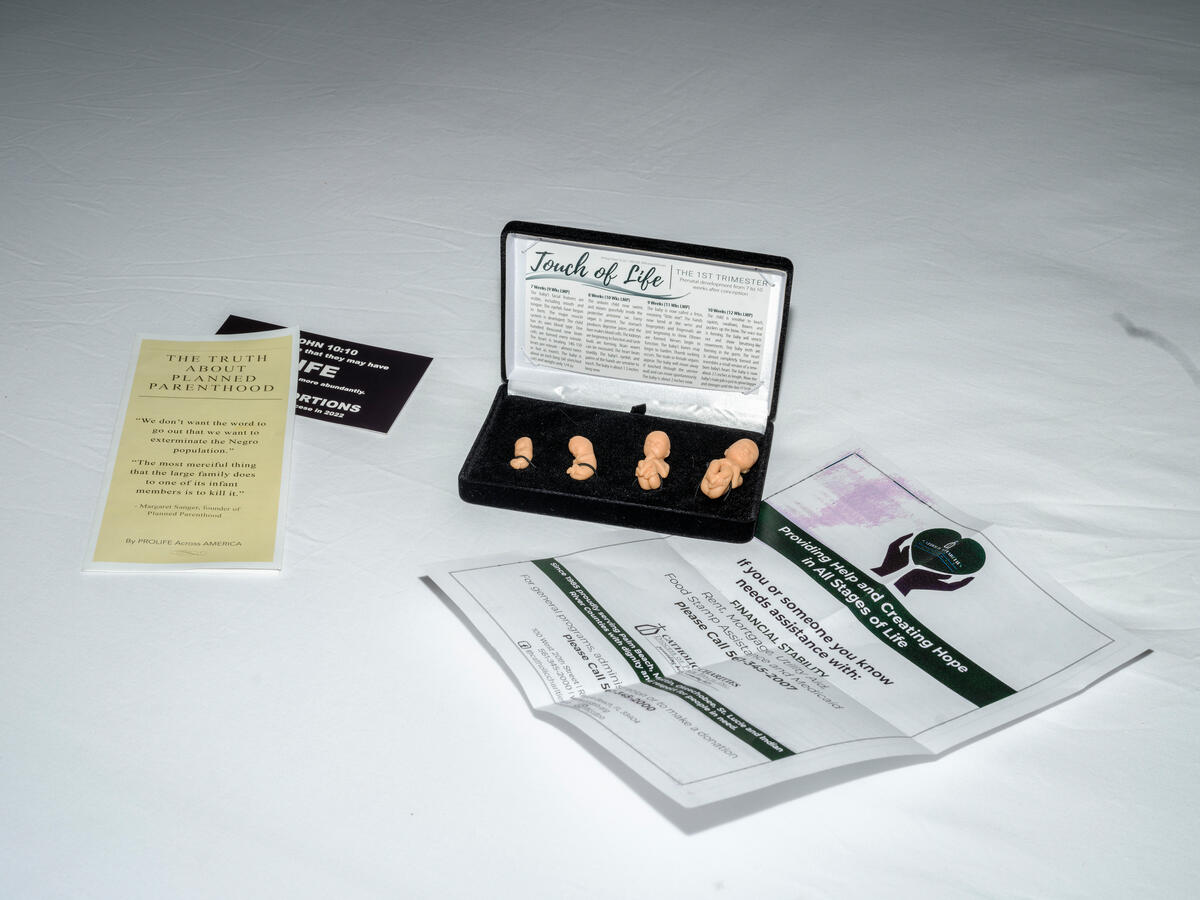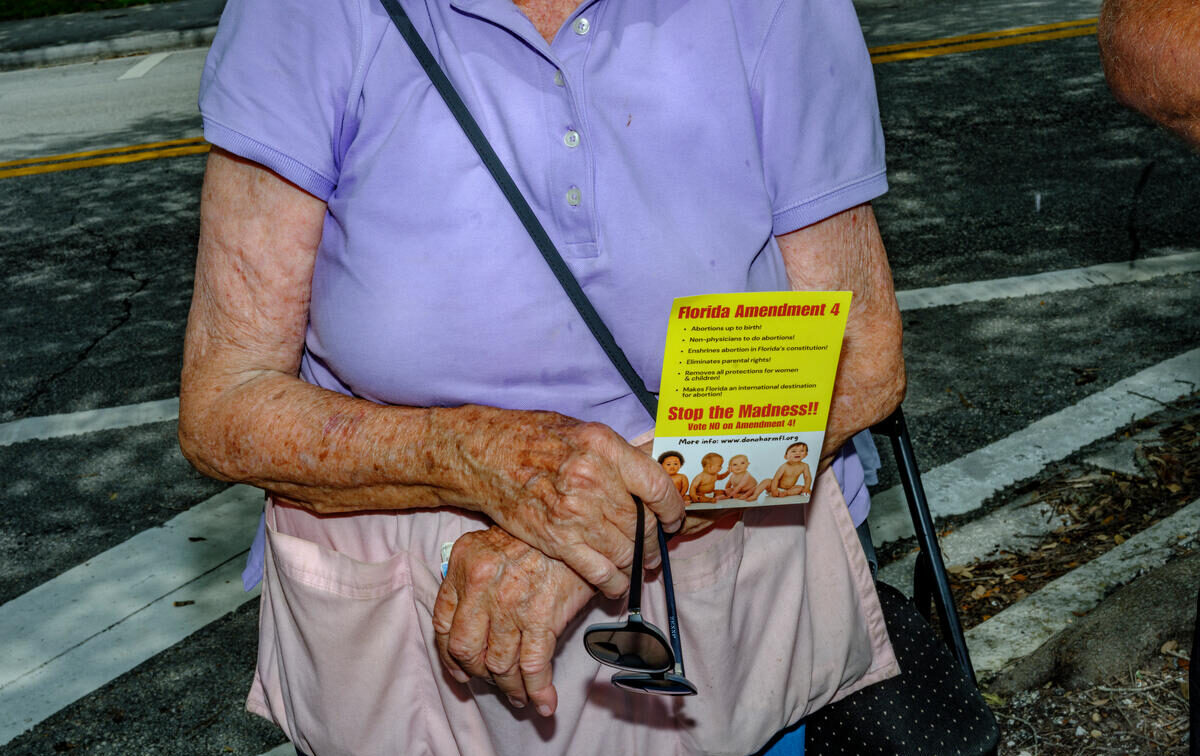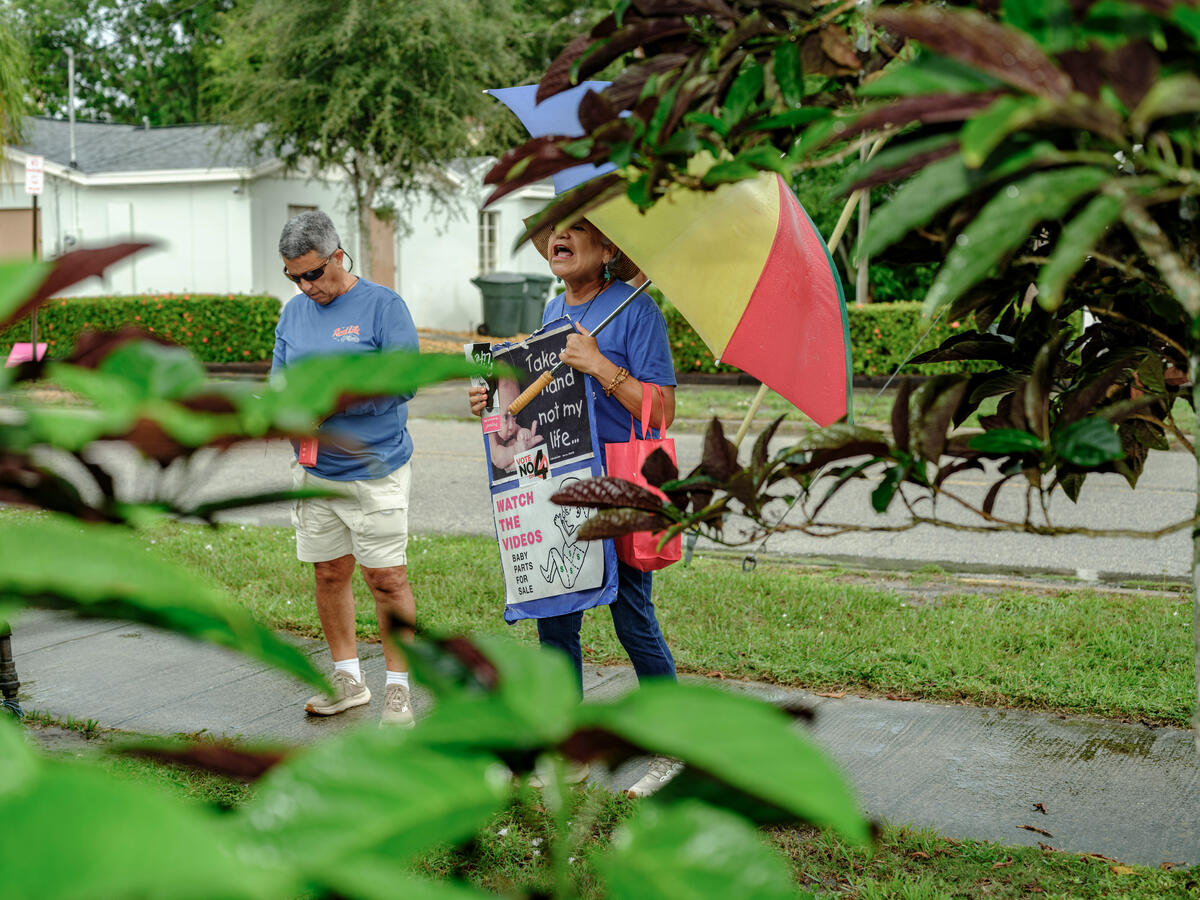1). “Donald Trump Wants to 'Protect' Women...Whether We Like it Or Not”, Oct 31, 2024, Jessica Valenti, Abortion, Every Day, at < https://jessica.substack.com/
2). “The Catholic Church Is Spending Big to Defeat Abortion Rights Ballot Measures: From Florida to Colorado, diocese and organizations are backing pro-life campaigns”, Oct 31, 2024, Heidi Schlumpf & Russ Choma, Mother Jones, at < https://www.motherjones.com/
3). “Tax Credits for Harassing Women: Farm radio and an anti-choice tax scheme”, Oct 31, 2024, Jess Piper, The View From Rural Missouri by Jess Piper, at < https://jesspiper.substack.
4). A comment posted to “Tax Credits for Harassing Women: Farm radio and an anti-choice tax scheme”, Oct 31, 2024, Pediatrics On The Front Line, The View From Rural Missouri by Jess Piper, at < https://jesspiper.substack.
5). “On the Front Lines of Florida’s Abortion Wars: With reproductive rights on the ballot, tensions are higher than ever in abortion-clinic parking lots”, Oct 30, 2024, Simon Petite, The Nation, at < https://www.thenation.com/
6). “When pregnancy turned to miscarriage, woman says Georgia's abortion laws delayed the care she needed: 'Your baby is dead or dying inside you, you're just waiting to crash,' Avery Davis Bell told USA TODAY”, Oct 30, 2024, Mary Walrath-Holdridge, USA TODAY, at < https://www.usatoday.com/
~~ recommended by dmorista ~~
Introduction by dmorista: As the actual Voting Day, Nov 5, 2024 looms, the deadly struggles over Abortion Access and Reproductive Health Care Rights continue unabated. In Item 1)., “Donald Trump Wants to 'Protect' Women …”, Jessica Valenti points out the ludicrous nature of that ridiculous statement. She provides a wrap-up of many issues in the Abortion Access struggles around the entire Country. And from Item 2)., “The Catholic Church Is Spending Big …. “, there is some excellent analysis of the role of the Catholic Church in trying to block the various state ballot proposals to protect Abortion Access.
Item 3)., “Tax Credits for Harassing Women: ….”, discusses the Abortion Issue as seen by rural right-wingers. The related Item 4)., “A comment posted to ….”, includes an eye-opening discussion of the options physicians have and the agonizing choices parents must make when very early term babies are born.
Item 5)., “On the Front Lines ….” provides a detailed view of the sorts of struggles going on in Florida.
Item 6)., “When pregnancy turned ….” reports on the horrific experience of a well educated middle class woman (who holds a Ph.D. in Genetics) in Georgia with a doomed pregnancy. More reports of terrible suffering caused by the dictates of abysmally ignorant legislators carrying water for right-wing extremist operatives and billionaires.
Remember that Harris and Walz, though nowhere near good enough, are actually somewhat better. The Republican Party will bring us even more machine guns in the hands of the right, and women tortured by the horrors of the Post Dobbs milieu.
xxxxxxxxxxxxxxxxxxxxxxxxxx
Donald Trump Wants to 'Protect' Women...Whether We Like it Or Not
Click to skip ahead: In Anti-Abortion Strategy, conservatives’ response to the death of Josseli Barnica. A Georgia woman’s miscarriage treatment is seriously delayed in Care Denied. In the States, news from Wisconsin, Texas and Louisiana. Ballot Measure Updates on fundraising, Missouri, Nebraska and more. In 2024 news, Trump wants to be our protector whether we like it or not. Finally, In the Nation has some quick hits and the recording of my first Substack livestream!
Anti-Abortion Strategy
I’m still reeling from ProPublica’s investigation into Josseli Barnica’s death, the young Texas mother who died of a preventable infection because the law prevented doctors from treating her miscarriage.
As expected, anti-abortion groups have responded to Barnica’s death by blaming “media and abortion advocates” for creating “confusion” about the laws. Susan B. Anthony Pro-Life America (SBA-PLA) and the Charlotte Lozier Institute (CLI) said in a statement yesterday, “Lies to women about their pregnancy care are at the root of this tragic case.” Their claim is that pro-choicers are scaring doctors out of providing care, and women out of seeking it.
I started warning about this strategy two full years ago, and it’s rapidly gained steam as more stories of post-Roe deaths have become public. Remember, it wasn’t so long ago that SBA-PLA launched a half-million dollar ad campaign blaming pro-choicers for the deaths of Amber Nicole Thurman and Candi Miller in Georgia. (The TV spot declared, “The Left’s scare tactics are deadly.”)
While it’s easy to dismiss these attacks as a transparent move to shirk responsibility—which it is!—it’s important that we don’t just shrug it all off. Conservatives are putting a lot of energy into this strategy, and it’s not just limited to noxious press releases from extremist organizations.
If you’ve been reading the newsletter closely over the last few weeks, you know that the Republican governors of Florida and Nebraska have both held press conferences recently with anti-abortion doctors, claiming that pro-choice “misinformation” is putting women’s health and lives at risk.
In fact, Gov. Ron DeSantis’ office used this exact argument to justify threatening TV stations with criminal charges for airing Amendment 4 ads! Republicans claimed that these pro-choice ads—highlighting how Florida’s ban denies women needed care—were as reckless as falsely reporting a shutdown of the state’s 911 system.
In other words: this isn’t just going to be central to their messaging strategy—but to their political attacks, too. Imagine pro-choice ads, campaigns and websites being suppressed for revealing what bans do to women, all under the auspices of protecting women’s health. It’s not so far fetched; after all, this is the excuse Republicans used to force doctors to lie to women about the so-called dangers of abortion.
Related anti-abortion strategy news: I predicted yesterday that anti-abortion groups would respond to Barnica’s story by insisting that Texas law allows for life-saving “care,” or for doctors to “intervene.” But, I pointed out, they would never say that doctors were legally allowed to provide ‘abortions.’
And that’s precisely what happened a few hours later: SBA-PLA and CLI released a statement saying that Texas law allows “emergency care,” “treatment” and for doctors to “intervene.” They did not use the word ‘abortion.’ That’s because these groups insist that abortion is never necessary, even to save someone’s life.
Given that these are the activists drafting and lobbying for these laws, it seems to me it’s something we should be making voters more aware of.
Care Denied
USA Today published a nightmare story out of Georgia yesterday, where a miscarrying woman was denied timely care because of the state’s abortion ban.
Avery Davis Bell was early in her pregnancy when she was diagnosed with a subchorionic hemorrhage that caused bleeding and required frequent check ups and testing. By her second trimester, the bleeding became bad enough that Bell’s blood levels were going down and she needed to be put on bed rest. Eventually, Bell’s water broke prematurely—far too early for the fetus to survive.
Still, Georgia’s abortion ban prevented doctors from taking immediate action. "Your baby is dead or dying inside you, you're just waiting to crash,” Bell said. USA Today describes the 34 year-old mother lying in a hospital bed with blood hemorrhaging “in dinner plate-sized clots.”
The longer Bell went untreated, the greater her risk for infection—which can be deadly. (Remember, that’s how Josseli Barnica in Texas died.) And while doctors finally agreed that she legally qualified for an abortion, Bell wasn’t considered deathly-ill enough to forgo the state’s 24-hour waiting period:
“Bell said doctors grappled with when they could start the process of the procedure. It would take time for her cervix to dilate, but it was unclear to the medical team if beginning the dilation itself would be considered advancing an abortion before the necessary time was up.
‘All of this is stuff that I shouldn't have to think about and they shouldn't have had to think about. They should have said whatever is the safest thing, let's start it now. And they couldn't do that.’”
I don’t know how anyone can read something like this and not understand that pregnancy is too complicated to legislate. It also gets at something I wrote yesterday: conservatives want women’s suffering to become business as usual. They want us to accept the idea that it’s perfectly fine for women to lay in a hospital, in pain and bleeding, so long as she comes out alive on the other end.
I’m glad Bell is here, and that she got the care she needed eventually. But this was torture, plain and simple.
In the States
I know we’re all preoccupied with the election, but we should be keeping an eye on Wisconsin. On November 11th, the state Supreme Court will start to hear oral arguments in a case that will determine abortion access in the state.
In case you need a refresher: The suit going in front of the Court challenges the 1849 law that Wisconsin Republicans say bans abortion. Essentially, after Roe was overturned, this 1849 law—created before women had the right to vote—was treated as a total abortion ban, preventing doctors from providing care. But last summer, a judge ruled that the law isn’t actually an abortion ban at all—but “a feticide statute only.” (Meaning it only applies to an attack on a pregnant person that ends the pregnancy, not abortion.) That ruling opened the door for clinics to provide care again, even though anti-abortion groups claimed the law remained in effect as a total ban.
In the meantime, Democratic Attorney General Josh Kaul filed a suit arguing that the 1849 law is too old to enforce, and that it’s trumped by an 1985 law permitting abortions. Planned Parenthood of Wisconsin also filed a suit, but it’s just Kaul’s that’s being heard in November as far as I can tell.
Here’s the good news: Thanks to voter ire over abortion bans, the Wisconsin Supreme Court is now under liberal control. The issue drove voters out to support newly-appointed Justice Janet Protasiewicz, who changed the makeup of the Court. That means abortion rights activists have a very good chance of winning.
In Louisiana, abortion rights activists and patients have filed a challenge against the new law that classifies abortion medication as a controlled substance. Thank goodness, because this law is incredibly dangerous. The medication is used in obstetric emergencies—like hemorrhaging. But because the drugs now have to be locked away, doctors have been running timed drills in hospitals to see how long it would take them to get from the locked-up pills to a bleeding patient.
The law has only been enacted a few weeks, and patients have already had a hard time accessing the pills, even when they need it for procedures like uterine polyp removal. From Michelle Erenberg, executive director Lift Louisiana, one of the plaintiffs:
“We will not sit back while anti-abortion lawmakers force people in our state to carry pregnancies against their will and then make those pregnancies more dangerous.”
Other plaintiffs include three Louisiana women—Nancy Davis, Kaitlyn Joshua, and Kaylee Self. Davis and Joshua were both denied vital abortion care and have been sharing their stories around the country. Self is a pregnant pharmacist, bringing the case forward on behalf of herself and potential patients.
The other thing to remember about the Louisiana law is that it allows the government to track who is dispensing and obtaining the pills in a state database. This is a big reason why they pass the law to begin with: As you know, data, abortion ‘reports’ and tracking have become a huge part of the anti-abortion movement’s post-Roe strategy.
You can read more about the lawsuit here.
The New Yorker covered the anti-abortion ordinance fight in Amarillo, Texas, where a group of local activists are working to stop extremists from passing a travel ban in their town. Several Texas counties have passed similar bans, which make it illegal to help a person leave the state for an abortion using county roads and highways. (The penalties are civil, not criminal.)
This is part of a broader trend of anti-abortion activists going to small towns across the country to lobby for what they’re calling ‘anti-trafficking’ ordinances. When one of the architects of this strategy was asked how he could call something ‘trafficking’ when you’re talking about adult women leaving the state of their own accord, he said: “The unborn child is always taken against their will.”
And there it is: They want to call women who leave the states for abortion care ‘traffickers’ of their own pregnancy.
In addition to furthering restrictions on travel, these ordinances are there to create a chilling effect that prevents people from helping each other and—they hope—to get a lawsuit going on the Comstock Act that could make its way all the way to the Supreme Court. So, bad times all around.
xxxxxxxxxxxxxxxxxxxxxxxx
The Catholic Church is spending big to defeat abortion rights ballot measures
Mother Jones; Getty; Megan Varner/Getty
This story was produced in partnership with the National Catholic Reporter.
Since Roe v. Wade was overturned in 2022, every state-level campaign to limit abortion has failed. But that hasn’t stopped Catholic organizations from stepping into the fight again this election year.
Catholic organizations are bankrolling campaigns against abortion-rights measures, spending more than $1.9 million so far in five of the 10 states where such measures are on the ballot, according to a joint investigation by National Catholic Reporter and Mother Jones.
In Florida alone, dioceses and bishops have spent more than $1.1 million, and church entities in South Dakota have recently ramped up spending as the election nears. In other states, the church’s hierarchy may be sitting out financially, but wealthy individuals with well-established associations with the Catholic Church, or church-affiliated groups—like local parishes and Knights of Columbus chapters—have stepped into the fray.
The fight in Florida over Amendment 4—a ballot initiative to add the right to an abortion in the state constitution—has become a political lightning rod, so it may not be surprising that the high-profile battle has attracted heavyweight donors from across the country. Florida requires 60 percent voter approval to amend the state constitution.
Abortion-rights groups have raised at least $60.7 million, swamping the $9 million raised by anti-abortion groups—both sides flooding the airwaves with ads. The majority of the money pouring in on the abortion-rights side is from major national groups like the American Civil Liberties Union and Planned Parenthood. Catholics for Choice has contributed just $10,378 to the fight in Florida. (Searches in other states turned up no other donations from Catholics for Choice.)
With the appearance of a showdown between the powers on each side of the national debate, it may be fitting that the Miami Archdiocese has given the most money of any church organization in the country this year—three donations totaling $384,000 to a political action committee called Florida Voters Against Extremism.
The Florida Conference of Catholic Bishops has donated another $271,000, and the Catholic dioceses of Venice, Palm Beach, and St. Petersburg gave $100,000 each. Dioceses in Orlando, St. Augustine, and Pensacola also donated.
Various Florida Catholic dioceses and the state’s bishops’ conference have stepped in, financially, during previous ballot initiative fights, but never on this scale— prior to 2024, they had given just $198,000.
The church in Florida has made these donations, a representative from the bishops’ conference said, because “it would be unconscionable not to defend against this threat to the sanctity of unborn life and the dignity of pregnant women.”
The money comes from diocesan and individual contributions to the conference’s general operating funds, said Michele Taylor, associate director for communications. “Dioceses and the conference observe Florida election and campaign finance laws and so there have been no special collections for the defeat of Amendment 4,” she said.
Diocesan donations in other states were substantially smaller, but so is the overall size of the ballot initiative fights. In South Dakota, for instance, the Sioux Falls Diocese has donated $340,000 to two separate anti-abortion PACs fighting to block a ballot initiative to create a similar protection for abortion rights in the state constitution.
The one abortion-rights group raising money to support the ballot initiative’s passage had only raised $298,000 in September and October. The Sioux Falls Diocese’s donation included an in-kind donation of $40,000 for polling work. All of the diocese’s donations have been made since September 25.
Similarly, in Colorado, despite a heavily funded abortion-rights PAC filling the airwaves with ads in support of Amendment 79, another effort to install a right to abortion in the state constitution, the Catholic Church had seemed to be uninterested—at least in terms of financial donations—in the fight until very recently.
But on September 11, the Denver Archdiocese sent a $50,000 check to the Pro-Life Colorado Fund, and it sent a second much larger check for $175,000 to the same group on October 22.
In Missouri, by contrast, the St. Louis Archdiocese, four other dioceses around the state, and the state bishops’ conference all donated $5,000, but earlier in the year and only to the effort to block an abortion ballot initiative from ever getting on the ballot. Since the initiative was approved for the ballot, the dioceses haven’t donated again.
Some Missouri pro-life groups had hoped the fight against the constitutional amendment for abortion rights would attract more national money, said Jamie Morris, executive director of the Missouri Catholic Conference, the church’s public policy agency in the state. He believes the focus on the presidential race, and ones in the Senate or House, put the financial focus elsewhere.
Losses in previous amendment battles, as in Ohio and Kansas, also may have dissuaded funders, Morris said. “I do think ours is tighter than Ohio’s ended up,” he said. “It would seem ripe for someone to come in and at least get some messaging and funding out there to push it over the top.”
Polling shows more than half of Missourians favoring the amendment, with 34 percent opposed. The Ohio abortion-rights measure was approved 57 percent to 43 percent in 2023.
In some states, spending from groups or individuals closely associated with the church has dramatically augmented or, arguably, eliminated the need for church spending.
In South Dakota, for example, where diocesan spending has been heavy, the national Knights of Columbus organization, based in New Haven, Connecticut, contributed $200,000 to a group opposing that state’s constitutional amendment on abortion. In Missouri, where the dioceses have spent only $25,000, the state Knights of Columbus chapter has chipped in $75,000.
In Nebraska, two ballot initiatives—one seeking to block abortion rights, the other to add it as a constitutional right—have attracted millions in spending, but none from that state’s dioceses. But two families of prominent Nebraska Catholics have contributed more than $6.6 million of the total $7 million donated to anti-abortion committees in the ballot initiative fight.
Marlene Ricketts, the wife of TD Ameritrade founder Joe Ricketts, and her son, Sen. Pete Ricketts (R), Nebraska’s junior senator, have contributed $5.1 million. The Ricketts family are prominent Catholics, and Joe Ricketts has given millions to the Catholic Church in Nebraska, including spending an estimated $34 million on the creation of a Catholic religious retreat.
Two members of another family, the Peeds, who have recently become prominent donors in conservative political and Catholic circles, chipped in another $2 million. Family matriarch Rhonda Peed has said faith drives the family’s charitable giving, including some $1.8 million to the Diocese of Lincoln, Nebraska, in the past two decades.
In Missouri, prominent conservative and anti-abortion attorney John Sauer has contributed roughly $757,000 to the fight over abortion. Sauer, a former solicitor general of Missouri, has represented anti-abortion groups in the past and successfully defended a Catholic priest accused of sexual abuse.
In January, Sauer represented former President Donald Trump in his successful claim before the US Supreme Court claiming broad presidential immunity. Missouri state campaign finance records show that this year Sauer gave $500,000 to Missouri Right to Life, which was spent to oppose an abortion-rights ballot initiative, and $257,000 to a political committee set up specifically to oppose the initiative as well.
Representatives from the Sioux Falls Diocese and the Denver Archdiocese did not respond to interview requests.
In all 10 states with abortion ballot measures, Catholic groups and dioceses are working to oppose abortion-rights amendments with mailings, bishops’ statements, videos, prayers and other resources in English and Spanish. Says Morris of Missouri: “It’s kind of an all-of-the-above approach.”
Yet, the effectiveness of church attempts at persuasion are questionable. A recent poll of Catholic voters in seven battleground states found that the hierarchy’s influence on voters in their flock is extremely limited. Only 32 percent said bishops were very or somewhat influential in voting decisions, and 37 percent said priests were, according to the poll, which was conducted by the National Catholic Reporter.
Political strategies, like funding statewide anti-abortion initiatives, is only a part of conservative Catholics’ “long game,” according to Mary Jo McConahay, author of Playing God: American Catholic Bishops and the Far Right.
Legal activist Leonard Leo, for example, has turned his attention from the US Supreme Court to a web of Catholic organizations aimed at instilling traditionalist values in the broader culture.
“I think ultraconservative Catholic intellectuals are leaning now in the direction of changing culture itself to achieve their various goals, including demonizing—or criminalizing—abortion, homosexuality, transgender people, etc., which also would move the country closer toward Christian nationalism,” McConahay said. “As long as the majority of the voting population is pro-abortion, Catholic money may start to go to this kind of longer-term effort, rather than fighting ballot measures.”
xxxxxxxxxxxxxxxxxxxxxxxxxxxxxxx
Tax Credits for Harassing Women
I always talk about meeting folks where they are and that can be harder than you imagine, but Wednesday I was given a chance to reach people who would normally never hear my message or even a Democratic one at that.
I just finished an interview with Farm Radio KFEQ…an AM station in St Joseph, Missouri. It’s called farm radio for a reason. A lot of farmers listen in their trucks and tractors and combines throughout the day. It’s talk radio. It’s pretty conservative.
I brought Halloween cookies to the studio to make sure we started off on the right foot — cookies are always a good idea. We went live after the station went over commodities and Ag news and closing markets. AgriTalk.
The topic I was there to speak on wasn’t corn or bean prices, though. It was abortion.
I went in thinking it was going to be a tough crowd, because I know exactly who listens to that station throughout the day…mostly conservative folks, mostly men, in the Northern part of the state.
The reason I went on this particular station in the first place is that the station decided to run the views and thoughts of two separate guests on the abortion amendment that is on the ballot in Missouri.
The radio station interviewed a man from the St Louis area by phone on Tuesday — a day before my interview. He represented the anti-choice point of view. I was on another call at the time and couldn’t listen in, but I had several friends send over his comments…I was as horrified as they were.
I called the station to ask for a recording of his interview so I could hear it for myself. Good god. It was bad. His segment on the abortion amendment was full of lies and half-truths that would make the devil blush.
I had to keep stopping the recording because I was so disgusted with his lies. I don’t know about you, but this is the same reason I can’t listen when Fox News is on. The lies make my brain hot. I get angry. I have to turn the channel.
The man interviewed was Brian Westbrook, the Executive Director and Founder of Coalition Life.
Westbrook told Barry Birr, the KFEQ radio host, that the language in the Missouri abortion amendment would make it possible for dental hygienists to perform abortions. That the amendment would provide an avenue for “child transgender surgeries.” That allowing women reproductive freedom would increase child sex trafficking.
Westbrook claimed the amendment would give women the right to murder full-term babies and that women couldn’t be trusted not to murder their full-term babies. That giving women the right to make decisions about their own bodies would lead to their own demise.
The worst part of this entire 30-minute segment? The host didn’t push back on the lies. The host even praised Westbrook for his “prayerful” approach.
But more than sharing lies, I wondered why this man from St Louis would be calling into a small farm radio show in St Joe. Why does he care about such a small population of folks in my neck of the woods?
I cracked open a Diet Coke and put on my glasses and started down a rabbit hole about Brian Westbrook and his organization.
I was suspicious of the Westbrook organization as soon as I read the site. One of the first things I noticed was this claim: “Are you aware you could benefit from the 70% MO PRC Tax Credit? Save up to$50,000 in Missouri taxes while supporting pro-life efforts!”
What? I have never heard of this claim and I wonder what sort of “pro-life” activism this really is? Surely no one would harass women and girls seeking medical care just for a grift? Surely no one would spend his time shutting down clinics and lobbying lawmakers and doing interviews on local radio stations to siphon money off the Missouri taxpayer, right?
From the Coalition Life site:
If you are a Missouri taxpayer and donate more than $100 to Coalition Life, you get to claim 70% of that on your Missouri State Income Tax Return.
With this tax credit, a donation of $1,000 to Coalition Life could be as little as $180 out of your pocket when factoring in the tax savings!
Both individuals and businesses are eligible for the credit.
The maximum tax credit is $50k (from a $71,500 donation).
This is a great way to reduce your Missouri tax liability while helping protect women and preborn children from abortion!
My god. This man is running an anti-abortion organization while doling out tax credits. Folks can receive tax incentives to push an abortion ban. Even businesses can receive a tax credit for harassing women and girls in need of reproductive care.
In case you are wondering, there are no tax credits for telling the truth or donating to Planned Parenthood…
A screenshot of the tax credit scheme on the Coalition Life website.
I never would have heard of Brian Westbrook if he hadn’t lied his way through an interview aimed at the farmers in my community. Someone needed to tell those farmers the truth. They are my neighbors and deserve the truth.
I went on that same radio show at the same time the next day to put things back to right — I was also interviewed by a different man who was the ultimate professional. He showed no bias in the interview.
In this interview, I was able to tell the truth about the abortion amendment. I was able to speak to the men listening in their trucks and tractors. The men drinking coffee at the local gas station. The men who would likely never seek out the wording of the amendment if it weren’t presented to them. The men who would likely vote against the amendment because their pastors and friendly Republican lawmakers told them “abortion is murder.”
Abortion is a nuanced issue. There is no black or white. Yesterday, I was able to speak to an audience that might have been unwilling to hear my message on any other outlet. I tried to speak with grace and subtlety. I tried not to beat them over the head with the evidence, but instead to tell stories to show the evidence. I reminded them that they know their wives and daughters and sisters and nieces. They know these women don’t get pregnant just to have an abortion.
They know better than that.
I reminded them that these same women are in danger in Missouri with an abortion ban. Pregnancy is too dangerous a proposition without the option of abortion…women are dying in ERs and in their homes each day waiting for the care that should have never have been withheld.
Sidenote: I have a group text full of teachers from across the country that I visit with every day. I told them I might be going into the lion’s den for the interview and asked them to think of me. One of my friends said this about the topic of abortion, “It’s hard to be nuanced when folks demand outrage.”
I could not have said it better myself.
Luckily, I was able to meet this audience where they are. In their trucks. On their tractors. On their combines.
I hope it made a difference.
~Jess
P.S. I want to invite you to an election night Zoom. Join me and hosts David Pepper and Michele Hornish – along with some really special guests – to watch the returns along with members of the Blue Ohio, Blue Missouri, Blue Tennessee, and Forgotten Democrats communities.
Here is the link: https://us02web.zoom.us/meeting/register/tZ0ufuyvqTkoG9QG9aBHIsUwF3QQ781jWmvd#/registration
My name is Jess and I was a high school Literature teacher for 16 years until I decided to run as a Democrat in a rural, red district in Missouri. I bring you news and politics from Missouri and beyond from a rural progressive point of view.
xxxxxxxxxxxxxxxxxxxxxxxxxxxxxxxxxxx
